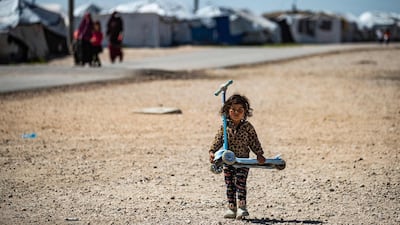UN Secretary General Antonio Guterres on Tuesday called on UN powers not to close the last remaining border checkpoint for aid flows into Syria, calling it "essential to save lives".
He urged the UN Security Council to keep the Bab Al Hawa crossing on the Turkey-Syria border open for another year, saying it was vital for the flow of food, Covid-19 vaccines and other aid.
US Secretary of State Antony Blinken on Monday said he wanted to keep Bab Al Hawa active and to reopen two other aid checkpoints that were closed after objections from veto-wielding Russia.
Moscow, an ally of Syrian President Bashar Al Assad's government, wants aid convoys in Syria to be run by Damascus and to cross front lines within the country.
"A large-scale cross-border response for an additional 12 months remains essential to save lives," Mr Guterres told a UN General Assembly event marking the 10th anniversary of the Syrian conflict.
“A failure to extend the UN’s mandate would end the UN’s Covid-19 vaccine distribution plans for millions of people in north-west Syria, and greatly diminish essential humanitarian operations.”
About 1,000 aid lorries crossed via Bab Al Hawa each month last year, bringing supplies from Turkey into Idlib province, as a lifeline for some 2.4 million people in the rebel-held north-west, the UN says.
The 15-member Security Council first allowed cross-border aid operations into Syria in 2014 at four points.
But last year, it reduced access to only the Bab Al Hawa crossing, due to opposition from Russia and China over reopening all four.
Russia used its UN veto to close checkpoints on the grounds that they violate the Damascus government's sovereignty. Moscow says aid should transit "cross-line" within Syria from government-held areas.
In a rare rebuke to a powerful UN member, Mr Guterres said the closure of Al Yarubiyah checkpoint on the Iraqi border last year had “worsened” conditions in the north-east, and the closure of Bab Al Hawa would do the same to the north-west.
"Cross-line convoys, even if deployed regularly, could not replicate the size and scope of this operation," Mr Guterres said.
“Despite significant and continuing efforts by the United Nations, we have not yet managed to create the conditions to deploy the first convoy from Damascus to north-west Syria.”
The council is set to vote on cross-border aid operations again in July.
Mr Guterres spoke as donors met at an online event co-hosted by the UN and the EU, aimed at raising more than $10 billion for aid work in Syria.
The UN seeks $4.2 billion to support the more than 13 million people in need inside Syria – a 20 per cent increase on last year – and $5.8 billion to assist refugees in Syria, Egypt, Iraq, Jordan, Lebanon and Turkey.
Covid-19 has compounded Syria's already dire economic situation.
The local currency has crashed and food prices have soared by 222 per cent from last year, pushing millions of people towards poverty and hunger.
A deal between Russia and Turkey has reduced the levels of fighting in Syria’s north-west, but the country’s humanitarian situation is worsening.
About 24 million Syrians at home and abroad need handouts – more than at any other time in the conflict.
Millions of people have left Syria and millions more have fled their homes since a crackdown by the government on protesters in March 2011 led to a multi-front civil war that has pulled in Russia, Iran, Turkey, the US and others.


